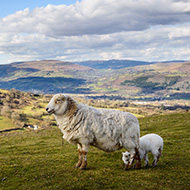New programme to eliminate sheep scab in Wales

Sheep scab affects 30 per cent of sheep in Wales every year.
The Royal Veterinary College (RVC) has announced a new programme to eliminate sheep scab from farms across Wales.
Developed in collaboration with farmers and Coleg Dir Ga, the All-Wales Sheep Scab Eradication Programme promises to be critical in reducing the prevalence of the disease in Welsh flocks.
Sheep scab affects some 2,000 farms and 30 per cent of Welsh sheep every year. Caused by the parasitic mite, Psoroptes ovis, the disease creates intense itching, wool and weight loss, and in some cases can be fatal - making it a major welfare concern.
Traditionally, sheep scab has been considered a sign of poor farming practice, which can have widespread, damaging effects on the Welsh farming industry.
As part of the new programme, all farms in Wales will be invited to self-report incidents of sheep scab to the project staff. The team will then take skin scrapes from affected sheep and, if positive, will take further bloods to be sampled for antibodies to Psoroptes ovis.
Farms that return positive results will also be dipped by contractors authorised under the programme. Researchers hope the scheme will not only encourage a significant drop in sheep scab cases in Wales, but also produce evidence about how farmers can work together to control disease beyond their own farms.
John Griffiths, programme manager of Animal Health and Welfare Wales at Coleg Sir Gar, said: “We are delighted to have been awarded the funds to deliver the all Wales Gwaredu Sheep Scab programme in partnership with the Royal Veterinary College.
“Evidence of Sheep Scab is frequently confirmed across Wales. It is hoped this consolidated industry wide effort will achieve significant gains in eradicating this disease. Working with Dr Neil Paton of the RVC we plan to roll out the Gwaredu Sheep Scab programme in 2023.”
Dr Neil Paton, technical lead for the All-Wales Sheep Scab Eradication Programme and lecturer in Farm Animal Health and production at the Royal Veterinary College, added: “Sheep Scab causes a severe welfare problem in flocks throughout the UK. Sheep will itch in response to infestation to the exclusion of all else, resulting in wool loss, severe skin lesions, open wounds weight loss, and in some flocks death.
“By coordinated diagnosis and treatment we hope to reduce the amount of disease seen in the Welsh flock and pave the way towards eradication of the mite.”
The project is being funded by the Welsh Government through the Rural Investment Schemes.



 The Veterinary Medicines Directorate (VMD) is inviting applications from veterinary students to attend a one-week extramural studies (EMS) placement in July 2026.
The Veterinary Medicines Directorate (VMD) is inviting applications from veterinary students to attend a one-week extramural studies (EMS) placement in July 2026.